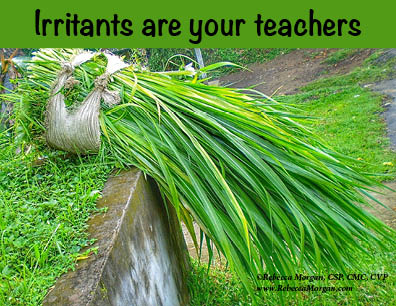Irritants Are Your Teachers
- You fume at the inconsiderate driver coming from your left who doesn’t turn on his right turn signal, causing you to wait longer than needed to turn right into his lane.
- You start counting how frequently your friend uses his catch phrase, “That’s crazy.”
- You can’t understand the rudeness of someone who asked you to call but hasn’t returned your call in a week.
These are but a fraction of potential everyday irritants. Not all are from strangers, some are from friends or family. They are ubiquitous.
Some are fleeting, lasting a few seconds. Some don’t cause more than a brief thought of “how rude.”
But even short-lived ones can cause you to react more than is warranted. Is laying on your horn to point out a driver’s lapse of curtesy really necessary? Is it worth it to get your blood pressure up, and perhaps do something that would endanger yourself or others?
The bothersome traits of friends, and especially family, are most irksome as you regularly endure them. Perhaps you get cross with them, finally exploding at some minor grating behavior. You’ve stashed away your peeves until you can tolerate them no longer. The challenge is even if your family member makes progress in reducing the offending behavior by 90%, you still notice the remaining 10% of instances. It’s frustrating for both, as your relative feels he’s trying really hard and made incredible progress. All you see is the remaining few occurrences as proof he has not tried hard enough.
When the annoyance’s source is someone with whom you work, hang out with, or are related to, it’s common to ask the person to stop. This can be a reasonable request if it’s something like touching you in a way you don’t like, or using abusive language toward you or others.
But what if someone has just a little vexing habit? They aren’t even conscious they are doing it. Or no one else has asked them to curtail it. Then really, where is the source of the peeve? The other person? Or…
You.
It’s hard to admit. It’s so much easier to blame someone else for your misery. Yet it is you. Because you have let it get to you, even if ever so slightly.
Instead, when you notice you’re irritated, how about asking, “What is the lesson in this for me?”
Your irritants become your teacher.
What are potential lessons?
- I want to be more conscious of using my turn signal every time so I’m as considerate of other drivers as I’d like them to be of me.
- I’m going to enlist a friend to help me become aware of catch phrases I use too often that I’m not aware of.
- I’m going to be more compassionate about other people not responding within the time I expect them to. I have no idea what stressors are going on in their lives that would prevent them from responding.
- I never want to be so self-absorbed that I use hurtful words instead of kind ones.
- I want to be much more mindful when I am irritated to look at the lesson for me.
I am joining you on this journey, as I have opportunities each day to look at my own teachers from irritants. I’m making progress, and know you will too!

